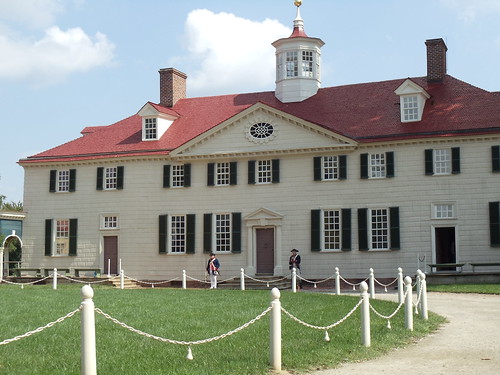At long last, the final installment of my Revolutionary trek across Virginia! And it has been so long since I started this (mini) series that I barely remember what I wanted to say… But I promise at least the pictures will be pretty.
In 1781, Washington really, really, really wanted to take back New York. In classic Freudian repetition George was ready to make another hopeless go at what had become an all-too-willing British stronghold. This time, however, he had a few boatloads of French soldiers to back him up, and he stood a real chance.
The problem was that those French soldiers had someplace to be, and that someplace was France. They were less interested in a New York City bloodbath than in getting things over as quickly as possible and getting on the boat back home. The fastest route to achieve that end was south, where French ships were already swarming their territory in the Caribbean lest the British navy try to extend its reach after pummeling the sorry American forces. General Rochambeau, a grizzled veteran of political and military battles alike for decades, gently prodded Washington in the direction he wanted to go. When word came that Admiral De Grasse just happened to swing by the Chesapeake Bay on holiday from his more lucrative tropical battles and beat a few holes in the British Navy’s line, Washington’s decision was made for him. He had to strike where the British were weakest, and that meant a long ride south to Virginia for all.
Washington had not been home in six years of fighting, but this would hardly be a relaxing homecoming. Upon nearing Mount Vernon, Washington rode ahead to arrive a day early and help Martha and the servants prepare for hundreds of houseguests with barely a day’s notice. Washington and Rochambeau would then meet in the mansion’s unfinished dining room while tents and troops were pitched everywhere on the grounds outside. Then they would ride to Yorktown, to their southern generals (including Lafayette, of course), and to victory.
Two hundred thirty years later on September 10-11, 2011, Mount Vernon, a ton of reenactors, and some French ambassadors decided to made a thing of it. They threw a big reenactment of the encampment to commemorate the event and the opening of a trail marking the route taken from New York. Mount Vernon is one of my favorite places on Earth, and I had to go.
Even wore my tri-cornered hat and (this is the only time in my life I’ll probably ever say this) wasn’t out of place at all.
For a super-sekrit military maneuver, there sure was a huge crowd of onlookers. The day started with Washington, Rochambeau, and Rochambeau’s translator explaining their plans to move on Yorktown. I think maybe the nation’s first spymaster needs a reminder about the definition of “clandestine service.”
Seriously. They even provided a sign language interpreter so no one would miss details of the plan.
I kid, I kid. But to make up for their lack of discretion, they were very snappy dressers!
And well-armed:
Mmm, provisions.
Back in the camp, I spent some time with some geographers where I learned how to, er, tell if a circle is round. Yeah, well, I guess science has to start somewhere, doesn’t it? Seriously, though, these guys were amazing.
These guys are awfully proud of their cannon. And… what’s that? A Spaniard?
These two were a hoot. They totally schooled me about Spanish involvement in the American Revolution, which I knew to some degree but not in so much detail. Spain, like France, would take any shot at Britain they could get, but unlike France, they weren’t about to give any crazy ideas to their own colonists that they were trying to beat down. Instead, they let Louis Seize run out in front and threw money and guns at the French effort from behind.
Unfortunately these guys also tried to convince me that King Carlos paid Lafayette’s salary, which I don’t think can be true. At least it wasn’t at the start of the War. Lafayette was an American major-general, meaning that whatever money Spain gave to France, it didn’t go to him. No, you don’t lose as much money as Lafayette did by taking a cut of the Spanish goods. You lose it by blowing it on your own ship and a crapload of guns so you can go play soldier without the King knowing. Continental Army doesn’t have enough money to pay or arm you? No prob! You just bring your own!
All this so a couple hundred years later you can be commemorated with your own pastry kiosk.
Washington was not fond of war. His letters from the front read like 18th century emo rock. When things were at their bleakest, I wonder that he didn’t throw himself off one of those sandstone cliffs in Virginia. But he always hoped for peace, and he always served when called even when it would have taken a mental patient to believe he could win. He was a reluctant leader who, unlike most other revolutionary generals, gladly relinquished power as soon as the country had legs enough to stand on its own, and in his late 60s, he died astonishingly young. (Those paintings were all made decades after his death. He never really looked that old.) So, I take solace in his choice of a wind-vane, especially now that I have moved to New Orleans.
And that’s all for that trip, kids. Now that I have moved allll the way down here, you’ll be hearing more about that soon.















